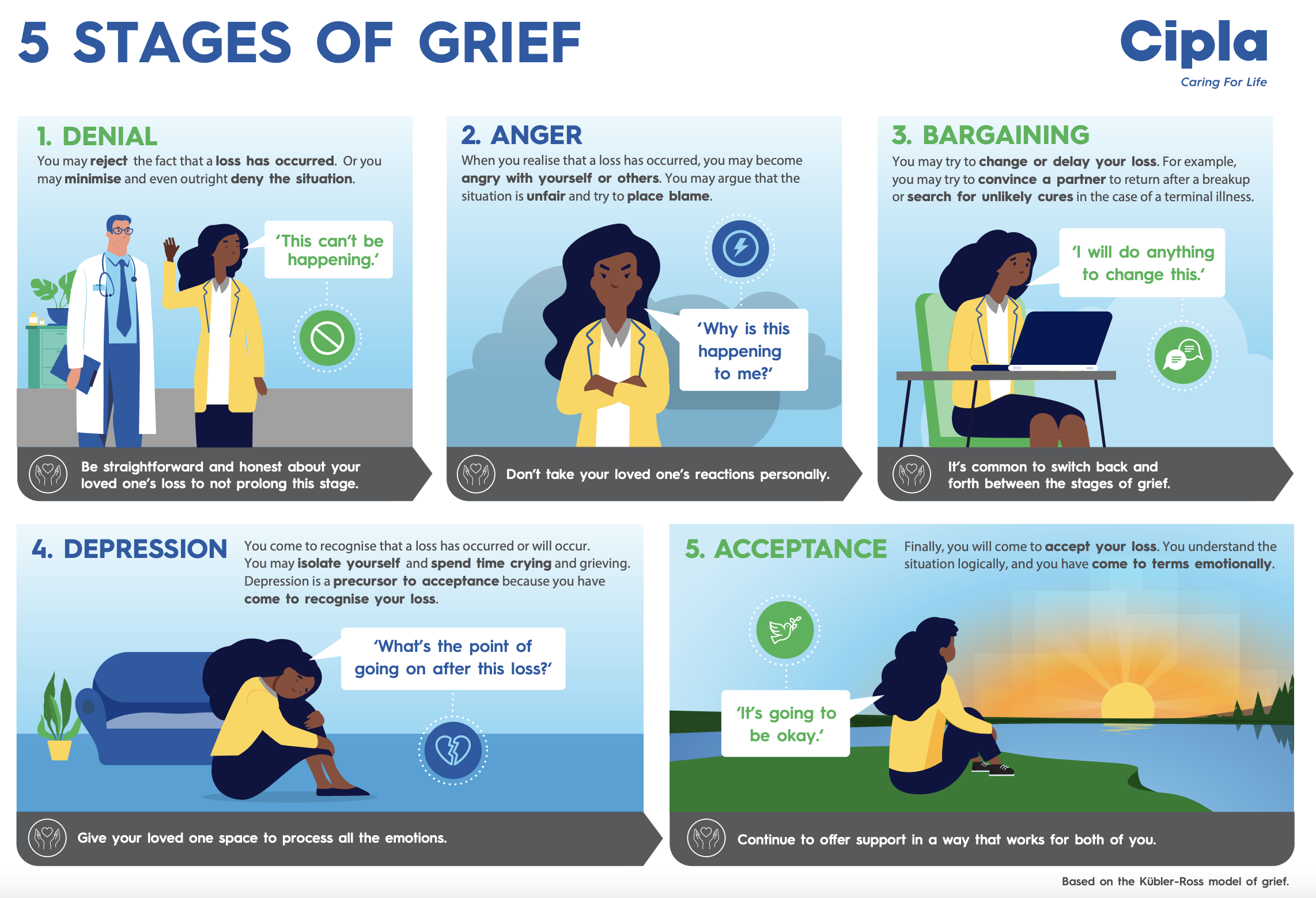Introduction
When hearing the dreaded words, “you have cancer”, there will no doubt be a whirlwind of emotions as you come to terms with your diagnoses and undergo treatment.
For some people, cancer equates to a sense of profound loss: loss of health, changes to one’s appearance, not being able to do your usual day-to-day activities, and a loss of independence or income.
Other people may undergo a time of reflection and re-evaluate their priorities or forge new connections.
All feelings are normal – there are no right or wrong emotions, as everyone deals with things in different ways.
How you might feel when diagnosed:
Shock
A common reaction to the initial diagnosis is a feeling of utter shock which translates into numbness or disbelief. Denial can function as a buffer, allowing time to come to terms with the diagnosis.
When in shock, you’re most likely unable to concentrate and absorb all the facts and information. It might be a good idea for a friend or family member to accompany you to doctor’s visits to help remember some of the key information.
Guilt
Many people with cancer feel guilty. They may blame themselves for causing their loved ones to worry, or they may feel like a burden, or may even blame lifestyle choices that they believe could have caused cancer. Just remember, cancer is complicated and cannot be attributed to one single cause.
Fear and anxiety
Feeling anxious or afraid of the future and the journey ahead is normal and to be expected. You may experience any of the following:
- Fear of death, even if your prognosis is good (How long do you have to live?)
- Fear of disfigurement or the side effects of the treatment
- How will you manage your responsibilities while undergoing treatment?
- Fear of losing your independence
- Fear of experiencing pain
- Fear of a potential loss of income
It is natural to be afraid of the unknown. Acknowledge your fear/s and share your concerns with someone to try and make it more manageable.
Overwhelmed
You may initially feel helpless like you're like is out of control because:
- Your usual routine is disrupted by check-ups and treatments
- You’re confused by the medical terminology
- You might feel like you can’t do the things you usually enjoyed
- You may feel lonely
There are ways that you can take charge. It may help you to learn as much as you can. Ask your doctor questions and don't be afraid to say when you don't understand. The more you know, the more in control you'll feel. Learning about your treatment can also help you to manage the side effects and be less influenced by other people’s bad experiences.
After careful consideration and in consultation with your healthcare professionals:
- You have the right to make your own choices
- You have the right to decide on the type and extent of treatment
- You have the right to get another medical opinion
- You have the right to refuse continued treatment
- You have the right to confidentiality and privacy
- You have the right to get counselling and the support you need.

Download 5 Stages of Grief Infographic
Psychiatrist Dr Elisabeth Kübler-Ross helped to improve our understanding of the five stages of grief.
- Denial: “No, it can’t be true!” This is a normal reaction to a cancer diagnosis.
- Anger: “It isn’t fair! I don’t deserve this”. It’s not uncommon that people get upset with themselves, friends, a loved one, God or even the medical profession. Anger sometimes also masks other feelings like fear or panic.
- Bargaining: “Please don’t let this be true. I will never again do this or that if my situation can be changed.” Bargaining rarely provides a solution to the problem.
- Depression: When you’re sad, you may experience changes in your energy levels, sleeping or eating patterns. Sometimes, these feelings lessen over time. For some people, the emotions can become stronger and interfere with daily life. Depression can be treated, so make sure you speak to your doctor or a trained counsellor (you can contact the free South African Depression and Anxiety Group helpline on 0800 456 789) to help the help you need.
- Acceptance: At this stage, a person has accepted the diagnosis and is prepared to fight cancer and make the most of each day.
How to tell your loved ones
Telling your loved ones that you’ve been diagnosed with cancer is not easy. Not only do you have to deal with your own emotions, but you also have to cope with the reactions of the people which you’re telling.
You may want to talk about your diagnosis to get support from your friends or family, or you may prefer to not initially tell people as you first come to terms with your diagnosis.
People might not know what to say. They may be sad or uncomfortable, worried about upsetting you, or frightened about the possibility of losing you.
Learn to talk honestly about how you’re feeling and encourage your loved ones to do the same. Sharing your fears and anxieties with each other might help everyone to better cope with the situation, and help everyone feel supported.
How will cancer impact your loved ones?
Cancer does not just affect the individual, it also affects their loved ones. Some people may behave in unexpected ways – some people may disappear and others might become overfamiliar. Give people time to adjust to the situation and learn how to best support them.
Learn to ask for, and accept help. This will help you to cope. If people offer help, don’t be ashamed to accept it. You need this help more than ever. Be kind to yourself.